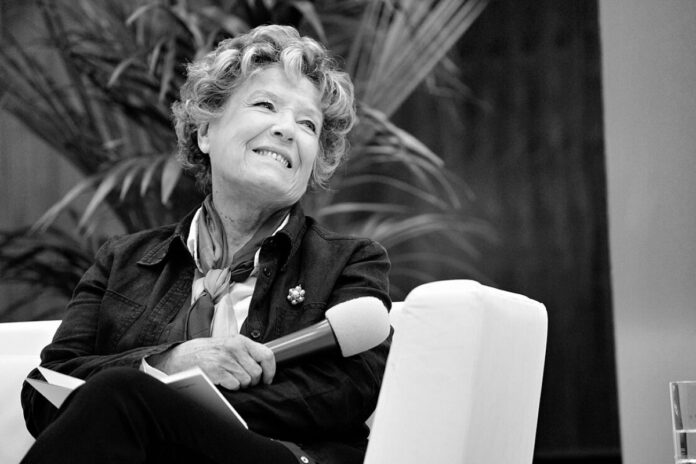Dacia Maraini (born November 13, 1936) is an esteemed Italian writer whose work primarily explores women’s issues, often through the lens of powerful narratives in both novels and plays. Her literary achievements have earned her several prestigious awards, including the Formentor Prize for L’età del malessere (1963), the Fregene Prize for Isolina (1985), the Premio Campiello and Book of the Year Award for La lunga vita di Marianna Ucrìa (1990), and the Premio Strega for Buio (1999). Maraini’s life has also been the subject of Irish Braschi’s biographical documentary I Was Born Travelling (2013), which delves into her time as a prisoner in a Japanese concentration camp during World War II and highlights her subsequent travels around the world with her partner Alberto Moravia, as well as close friends such as Pier Paolo Pasolini and Maria Callas.
Dacia Maraini is one of Italy’s most influential contemporary writers, whose works explore themes of gender, society, and human rights. Learn more about her remarkable life and career.
Introduction
Dacia Maraini is a name that resonates with literary enthusiasts and those interested in feminist literature alike. As one of Italy’s most prominent contemporary writers, her works have captured the hearts and minds of readers around the world. Maraini’s unique ability to blend social commentary with profound emotional depth has earned her a place among Italy’s literary greats. In this article, we’ll dive into her life, her significant contributions to literature, and the themes that define her body of work. Let’s explore the life of this literary icon and why her stories continue to inspire.
Early Life and Background
Dacia Maraini was born in 1936 in Fiesole, a picturesque town in Tuscany, Italy. Coming from an intellectual family, her upbringing was shaped by literature, art, and progressive ideas. Her father, Fosco Maraini, was an ethnologist, and her mother, Topazia Alliata, was a prominent figure in the arts. Despite the privilege, her childhood was marred by hardship as her family was forced into internment during World War II. This early experience of exile had a profound influence on Maraini’s outlook on life, particularly her views on freedom, identity, and the role of women in society.
Key Life Events:
- Dacia Maraini’s formative years were marked by adversity, which fueled her desire to write about societal issues.
- She attended the University of Milan, where she studied philosophy and literature.
The Rise of Dacia Maraini in Literature
Maraini’s literary career began in the 1960s, a period that was particularly transformative for women’s rights and social movements in Italy. Her first novel, “La vacanza” (The Holiday), was published in 1962 and immediately showcased her skill in exploring complex relationships and personal struggles. Over the years, her works grew in scope, touching on themes of gender, the role of women, and societal norms.
What sets Maraini apart is her ability to portray strong, multidimensional female characters, often caught in the tension between personal desires and societal expectations. Her writing is often described as both poetic and socially aware, weaving personal stories with larger questions about humanity.
Notable Works by Dacia Maraini:
- “La lunga vita di Marianna Ucrìa” (The Long Life of Marianna Ucrìa) – A historical novel about a woman who, despite her physical disability, triumphs over societal and personal struggles.
- “Il treno dell’ultima notte” (The Last Night Train) – A powerful work about a young girl’s experiences during wartime.
Themes in Maraini’s Writing
Dacia Maraini’s novels are known for their exploration of the human condition, particularly in relation to gender and social injustice. Her works often center on women’s struggles, both in personal relationships and within larger societal frameworks. Maraini’s focus on gender inequality is particularly evident in her portrayal of female characters who challenge traditional roles.
Some recurring themes in her work include:
- Feminism and Gender Equality – Many of Maraini’s works explore the complexities of womanhood and the fight for gender equality. She’s often credited for providing a voice to women in Italy’s male-dominated literary landscape.
- Freedom and Identity – Whether through historical fiction or contemporary narratives, Maraini’s characters often seek to assert their independence and establish their personal identity against societal pressures.
- Human Rights and Social Justice – Maraini’s works often address issues of human rights, using storytelling to shine a light on oppression and marginalization.
Dacia Maraini as a Feminist Icon
Dacia Maraini’s influence extends beyond literature; she is a recognized feminist icon in Italy and globally. Throughout her career, she has advocated for women’s rights and has been involved in various social causes, particularly those related to women’s empowerment and gender equality. Her works have provided a platform for women’s voices and have inspired generations of writers and activists.
Maraini has been outspoken about the role of women in literature, stressing that female writers offer unique perspectives that challenge the dominant narratives often created by men. She has also been involved in various feminist movements, working not just as a writer, but as a public figure who engages in social change.
Legacy and Impact
Dacia Maraini’s impact on Italian literature is profound and long-lasting. She has received numerous awards, including the prestigious Premio Strega, Italy’s most distinguished literary award. Maraini’s ability to address universal themes such as love, freedom, and societal constraints ensures that her work remains relevant today. As a writer, she has crafted stories that resonate with both personal introspection and larger societal struggles.
Her influence continues to inspire modern authors, and her work is studied in academic institutions worldwide. Maraini’s contribution to literature and society goes beyond mere storytelling—she has created a body of work that challenges readers to think critically about the world around them.
FAQ about Dacia Maraini
1. What are Dacia Maraini’s most famous works?
Some of her most famous works include “La vacanza,” “La lunga vita di Marianna Ucrìa,” and “Il treno dell’ultima notte.” These novels showcase her ability to explore complex human emotions, social issues, and the role of women in society.
2. How has Dacia Maraini influenced feminism in literature?
Maraini has been a vocal advocate for gender equality and women’s rights, often incorporating feminist themes into her work. Her portrayals of strong, independent women have helped challenge traditional gender roles in literature.
3. Is Dacia Maraini still writing?
Yes, Dacia Maraini continues to write and remains an active figure in the Italian literary scene. She is highly regarded not only for her novels but also for her essays and contributions to social and cultural debates.
4. What are some key themes in Dacia Maraini’s books?
Key themes in Maraini’s books include feminism, the struggle for gender equality, personal freedom, identity, and social justice. Her works frequently highlight the challenges faced by women in both historical and contemporary settings.
Wrapping Up
Additionally, Dacia Maraini’s journey as a writer and activist is one marked by a commitment to social change and literary excellence. Her works have helped shape the discourse around gender equality and human rights, while also offering rich, thought-provoking narratives. As a feminist icon, she has paved the way for future generations of writers who will continue to challenge societal norms and advocate for a more just world.
If you haven’t yet explored her works, now is the perfect time to dive into the world of Dacia Maraini—a place where powerful storytelling meets profound social commentary.




